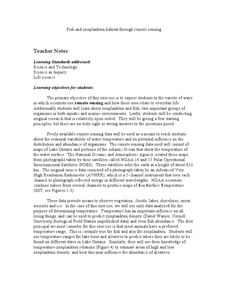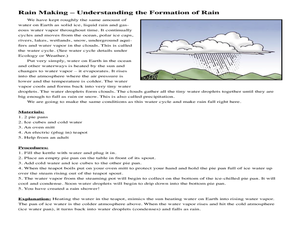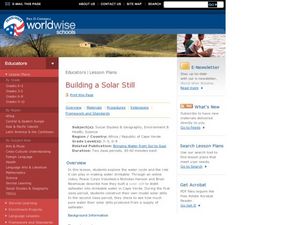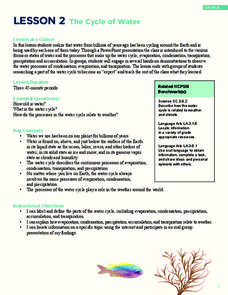Curated OER
Fish and Zooplankton Through Remote Sensing
Ecology aces examine sea surface temperature maps and relate temperatures to concentration in fish and zooplankton populations. Take your class to a computer lab and provide experience with actual remote sensing data. Some of the links...
Curated OER
Wind
Young scholars build an anemometer and measure wind speed. In this wind speed lesson plan, students build an anemometer using the student instruction sheet. Young scholars visit the Alaska windspeed website and look up the wind speed...
Curated OER
The Water Cycle (Evaporation, Condensation, Precipitation)
The 3 steps of the water cycle, evaporation, condensation, and precipitation, are the focus of this lesson. After a neat demonstration of rain using hot water, a pie tin, and ice cubes, young scientists observe and discuss the elements...
Curated OER
The Water Cycle and Sources of Pollution
Students make an island that has a construction site on it. They spill siulated pollution and trash on top of the island and then water it to simulate rain. They will observe how the rain washes dirt, sand, and pollution off the island...
Curated OER
Environment: Sounds of the Natural World
Second graders describe and imitate sounds from the natural environment including rain and snow. After listing materials that could be used to make rainsticks, they create their own instruments from cardboard tubes,beans, and sand. To...
Curated OER
Water Web
In this water web activity, students explore, analyze and discuss how weather stations interact with maintaining weather conditions and answer two essay questions and ten multiple choice questions.
Curated OER
Tornado!: Types and Formation
Students discuss the different types of tornadoes and how they form. Working in groups, they record journal entries by conducting experiments with water bottles simulating vortex formation.
Curated OER
Rain Making - Understanding the Formation of Rain
Learners read and conduct and experiment to learn about rain formation. In this water forms instructional activity, students read about the formation of rain and its purposes. Learners then complete a rain experiment activity.
Curated OER
What's Making It Look So Brown Outside?
Ninth graders analyze cars and particulate matter in the atmosphere. They analyze results of particulate pollutants and identify which vehicle gives off more particulates. They identify sources of particulate matter and relate to...
San Francisco Public Utilities Commission
What is Drought? No Rain, No Water
How can climate change affect our water supply? Have kids read a passage about the water cycle and water conservation, which includes six questions that challenge them to use context clues.
Curated OER
Water, Water Everywhere
In this water instructional activity, students complete a five question multiple choice online interactive quiz about water. This is a more advanced quiz that includes chemistry questions.
Curated OER
Observing Weather
Students investigate the weather by reading children stories. For this weather observation lesson, students read Cloudy With a Chance of Meatballs and several other stories about weather before they create a KWL chart. Students utilize...
Curated OER
Water Cycle
Young scholars identify the different stages in the water cycle. In this earth science instructional activity, students calculate the residence time of water in oceans using a mathematical formula. They explain how this cycle regulates...
Chicago Botanic Garden
Causes and Effects of Climate Change
Wrap-up a unit on global climate change with a lesson that examines the causes and effects of climate change. Learners fill out a chart that represents what they think causes climate change—natural and human-based—and what they think...
Chicago Botanic Garden
Causes and Effects of Climate Change
It's time for your class to literally show what they know! Pupils illustrate what they learned about the causes and effects of climate change by filling out a graphic organizer to complete the 5-part series of lessons. They discuss them...
Curated OER
Building A Solar Still
Students investigate the water cycle by viewing an online video. In this drinking water instructional activity, students create solar stills at their campus in order to purify water that is tainted. Students view a video on their...
Curated OER
Winter Wonderland - Winter Olympics and the Water Cycle
After a concise introduction to the water cycle, junior meteorologists access NOAA's average snowfall data. They choose a city to examine in terms of precipitation. Then they look at historical snowfall data and use it to predict snow...
SF Environment
Pre-School Composting and Recycling!
You can never be too young to get involved in composting or recycling. Here is a lesson that has been made for the very littlest learners and it's all about the importance of conservation. They'll sort compostable and recyclable objects,...
NOAA
The Cycle of Water
Help young scientists get to the bottom of the water cycle with this comprehensive earth science lesson. After first viewing and discussing presentations about the states of water and the water cycle, the class performs a series of...
NOAA
The Cycle of Water
Young water cycle enthusiasts discover the water they have been using has been cycling around the earth for billions of years. Through presentations, learners will understand that water has three states and how these forms fit into the...
KOG Ranger Program
The Value of Oregon’s Forests
No matter where you go, you're in the middle of a forest in some way. Use a lesson about forests and the many ways they contribute to our world, including the ecosystems of animals and plants living in their shady soil.
Curated OER
LESSON #2 SAFETY UNIT: Real-life reading selection
When studying pollution and the environment, you can use this activity as an enrichment. Safety-conscious learners read a 2005 article about an ammonia leak from a Kentucky fast-food product plant. They work in small groups to discuss...
Curated OER
Harvesting Water from Fog
Students analyze the water issues of Cape Verde in the Peace Corp lesson. In this water resources lesson, students analyze the concept of water being harvested from fog. Students explore the Peace Corps project site by watching Nathan...
Curated OER
Rain and Rainbows
Students explore the weather system by analyzing water properties. In this precipitation lesson, students review weather related vocabulary terms and discuss how rainbows are created by light hitting droplets at the right time. Students...

























